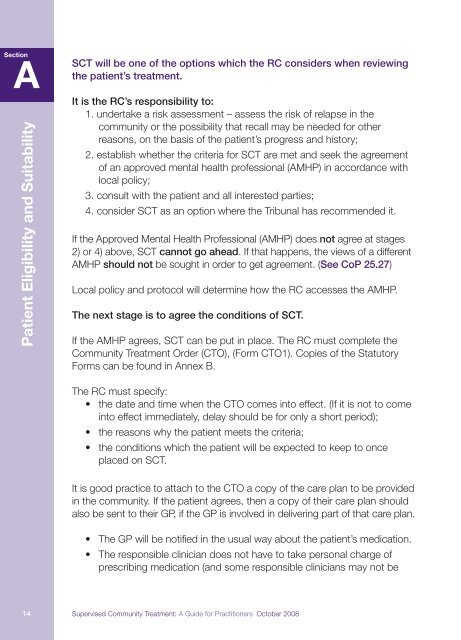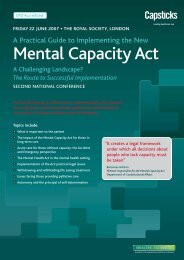Supervised Community Treatment: - Social Perspectives Network
Supervised Community Treatment: - Social Perspectives Network
Supervised Community Treatment: - Social Perspectives Network
Create successful ePaper yourself
Turn your PDF publications into a flip-book with our unique Google optimized e-Paper software.
Section<br />
Patient Eligibility and Suitability<br />
SCT will be one of the options which the RC considers when reviewing<br />
the patient’s treatment.<br />
It is the RC’s responsibility to:<br />
1. undertake a risk assessment – assess the risk of relapse in the<br />
community or the possibility that recall may be needed for other<br />
reasons, on the basis of the patient’s progress and history;<br />
2. establish whether the criteria for SCT are met and seek the agreement<br />
of an approved mental health professional (AMHP) in accordance with<br />
local policy;<br />
3. consult with the patient and all interested parties;<br />
4. consider SCT as an option where the Tribunal has recommended it.<br />
If the Approved Mental Health Professional (AMHP) does not agree at stages<br />
2) or 4) above, SCT cannot go ahead. If that happens, the views of a different<br />
AMHP should not be sought in order to get agreement. (See CoP 25.27)<br />
Local policy and protocol will determine how the RC accesses the AMHP.<br />
The next stage is to agree the conditions of SCT.<br />
If the AMHP agrees, SCT can be put in place. The RC must complete the<br />
<strong>Community</strong> <strong>Treatment</strong> Order (CTO), (Form CTO1). Copies of the Statutory<br />
Forms can be found in Annex B.<br />
The RC must specify:<br />
• the date and time when the CTO comes into effect. (If it is not to come<br />
into effect immediately, delay should be for only a short period);<br />
• the reasons why the patient meets the criteria;<br />
• the conditions which the patient will be expected to keep to once<br />
placed on SCT.<br />
qualified to prescribe). Arrangements can be made for someone else<br />
to prescribe, including a GP. It should be noted that if an SCT patient<br />
lacks capacity to consent to treatment for mental disorder and no-one<br />
else is eligible to consent on their behalf, the treatment can normally<br />
only be administered to the patient by or under the direction of an AC<br />
who is qualified to prescribe that treatment. GPs will not usually be<br />
approved clinicians.<br />
• Once a Part 4A certificate (Form CTO 11) is needed for the patient’s<br />
treatment, unless the treatment is immediately necessary, no medicinal<br />
treatment for mental disorder can be given by anyone to an SCT<br />
patient in the community unless the certificate covers it.<br />
• Where it has been agreed that GPs will prescribe medication, they<br />
should not prescribe anything for the patient’s mental disorder which<br />
is not covered by the certificate. If the certificate needs to be changed,<br />
they should discuss that with the responsible clinician.<br />
• GPs can of course treat the patient as they see appropriate for any<br />
condition not related to their mental disorder.<br />
The CTO1, completed and signed by both the RC and the AMHP, must<br />
be sent to the hospital managers. The patient must be informed orally and<br />
in writing about the reasons for SCT, the conditions, how SCT works and<br />
of their right to apply to the Tribunal. It is the responsibility of the hospital<br />
managers to inform the patient about the Independent Mental Health<br />
Advocacy (IMHA) service, when this service commences. The information<br />
must be copied to the nearest relative, unless the patient requests otherwise.<br />
Responsibilities of the Approved Mental<br />
Health Professional<br />
Patient Status – Making the decision as to the patient’s eligibility and<br />
suitability for SCT<br />
Section<br />
Patient Eligibility and Suitability<br />
It is good practice to attach to the CTO a copy of the care plan to be provided<br />
in the community. If the patient agrees, then a copy of their care plan should<br />
also be sent to their GP, if the GP is involved in delivering part of that care plan.<br />
• The GP will be notified in the usual way about the patient’s medication.<br />
• The responsible clinician does not have to take personal charge of<br />
prescribing medication (and some responsible clinicians may not be<br />
The Approved Mental Health Professional’s (AMHP’s) formal role in<br />
setting up a CTO involves determining with the RC whether the criteria are<br />
met and that it is appropriate to make the CTO. The AMHP must also agree<br />
the conditions to be attached to the CTO, or they may disagree and suggest<br />
a variation in or additional conditions. The agreement of an AMHP is also<br />
necessary before an RC can extend or revoke a CTO.<br />
14<br />
<strong>Supervised</strong> <strong>Community</strong> <strong>Treatment</strong>: A Guide for Practitioners October 2008<br />
October 2008 <strong>Supervised</strong> <strong>Community</strong> <strong>Treatment</strong>: A Guide for Practitioners<br />
15










